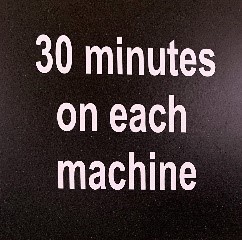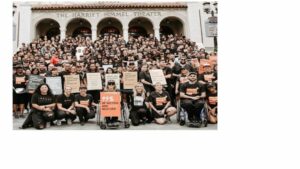
Here we were in Israel, my two sons Jeff and Andy, Andy’s wife Kristen, and I, hoping for a trip of a lifetime, but wondering if we should just turn around and come home. We had been removed from our tour bus when the air raid sirens sounded, but once they stopped, we re-boarded to head to Jerusalem where we would walk the path of Jesus.
Anticipating a weepy, serene experience, I had taken a purse-load of Kleenex. I didn’t need them. Thousands of other tourists crammed into the walkway, and guides held flags on sticks above their heads so their group could find them. Most times, we were to hurry into a church or scenic area before another group beat us there. We were told we were on the Via Dolorosa, and there certainly were Stations of the Cross hanging on stone walls, but because of jostling with the crowds, the spiritual feeling evaded us. At the end of the day, we were sad that the seven-hour experience had become so commercial (and yes, we were part of the problem).
During the day, we were inundated with news that the Gaza Strip soldiers were shooting missiles at Israel in retaliation for Israel’s drone strike, killing a Jihad leader and his wife. We learned that Israel protects itself with an Iron Dome which detracts incoming missiles, but occasionally the missiles sneak through cracks in the Dome. Before the Dome, we were told, residents used to run to storm shelters when the air sirens sounded, but post-Dome, they now run outside to watch the incoming missiles blow up. Not my kind of photo-op.
I reminded the kids that we were in the country of God’s chosen people, so there probably wasn’t a better place to be. Nevertheless, we remained on alert.
That night, our landlady came by to reassure us that every newer apartment in Israel was required to have one room that served as a safe room in case of missile strikes. My bedroom was that for us. Comforting. I wouldn’t have to go far. It didn’t take long to test its usefulness. I had been asleep about an hour when sirens jolted me awake. I sprang from bed to alert the others, and when they ran to the balcony to listen for themselves, they told me it was an ambulance, not an air raid siren. Perhaps I was a little too edgy.
Day three. Today we bussed to the Dead Sea and the Masada. The guide began the morning bringing us up-to-date on how the Dome had, overnight, done its job—good news: more missiles had been downed. Still, much of our conversation centered around avoiding potential targets…as if we had any idea what those would be! An hour after leaving Tel Aviv, we were at the Dead Sea where we swam in the salty water, so salty it is impossible to sink. Even those like me who genetically cannot float, now could. It was one of the first times we actually relaxed and were able to ignore (somewhat) the threat surrounding us. (Would missiles float if they hit the Dead Sea?)
Two hours later, we boarded our bus for the Masada, Herod the Great’s fortress built atop a nearby mountain. To get there, sixty-two (maximum capacity) of us were crammed into a cable car which hoisted us to the top. There, we learned that although Herod visited the site only one time, those overseeing it were expected to keep it a running city, just in case he decided to pop in for a visit. With its vast storehouse for food, an exercise room, sauna and massive living quarters, what impressed me the most was the watering system made of cisterns which held more than one- million gallons of water. Oh yes, and the view of the Judean Desert—Amazing! Today, Masada is in ruins. Jewish zealots, revolting against Rome, conquered the area but in 72 A.D. were besieged when the Romans constructed an enormous ramp from which they battered the exterior wall. The zealots committed suicide rather than succumb to their deaths at the hands of the Romans. Israel certainly had a history of violence. We prayed that we would not become part of that history. Stay tuned for more adventures even we could not have anticipated.






